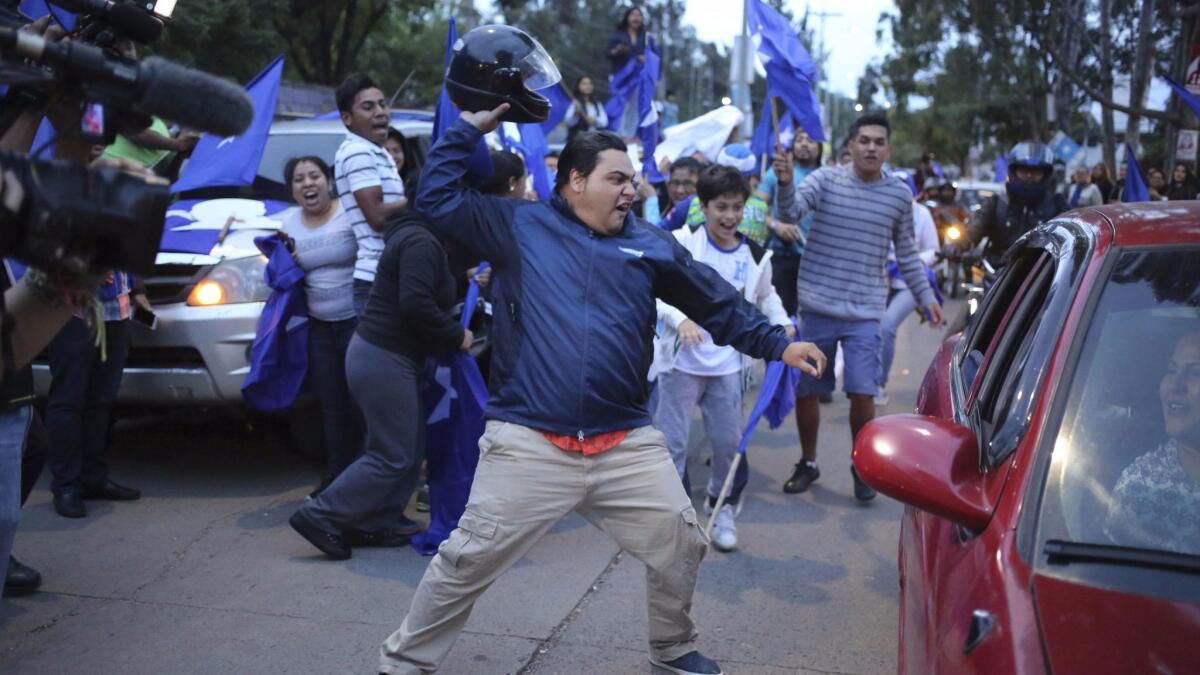Honduras still hasn’t declared a winner in its presidential vote — and tensions are rising

- Share via
Reporting from Mexico City — Protesters from opposing political parties took to the streets Tuesday in Honduras, where election officials still have not declared a winner in Sunday’s presidential vote amid allegations of fraud.
International monitors called for a speedier and more transparent vote count as several prominent civil society groups accused the government of slowing its release of tallies because it appeared the incumbent president was headed toward a loss.
After more than 24 hours without publicly updating vote tallies, the country’s electoral court reported Tuesday that with 67% of ballots counted, opposition candidate Salvador Nasralla led a field of nine candidates with 964,883 votes, or 44% of the total. President Juan Orlando Hernandez had 901,115 votes, or 41%.
The new tally represented a major gain for Hernandez, narrowing Nasralla’s lead from 93,975 votes to 63,768.
The court’s president said that it will take until as late as Thursday to tally the remaining votes and that election officials would not name a winner until every vote had been counted.
Growing uncertainty about who will lead the nation comes as both Nasralla and Hernandez have declared victory and have sought to rally popular support. Nasralla has been celebrating with boisterous public gatherings, and the head of the political party that Hernandez belongs to has urged the president’s supporters to take to the streets to “defend the triumph.”
The longer election officials wait to name a winner, the more likely there may be conflict, said Adriana Beltran, an expert on Central America at the think tank Washington Office on Latin America.
“The silence feeds into ongoing tensions,” Beltran said.
There is a growing suspicion among people from across the political spectrum that the vote count has been intentionally delayed so that officials can work out a secret deal that would benefit Hernandez, she said.
The nonpartisan civil society group N-26 said in a statement Tuesday that it believes that the final vote data have been available to the Supreme Electoral Tribunal for days, and it warned that the court’s “unjustified silence” would stoke distrust among voters. Respecting the final vote is the duty of candidates, it said: “We reiterate to the political parties their duty to be respectful of the institutions and the final results.”
Those who say Nasralla should have already been declared the winner point to a statement by Marcos Ramiro Lobo, a magistrate on the election court, who on Monday told the Reuters news agency that the court’s experts believed Nasralla’s lead was “irreversible.”
In a news conference Tuesday, the president of the electoral tribunal denied allegations of fraud.
“The will of the people is being respected and will not be changed,” tribunal President David Matamoros said.
The election was clouded in controversy long before voters went to the polls.
Eight years ago, Hernandez backed a military coup against former President Manuel Zelaya, in part because Zelaya had proposed running for a second term, which at the time was barred by the constitution.
But after Hernandez was elected president, several Supreme Court judges who were considered to be his allies voted to overturn the constitutional ban on term limits, and Hernandez announced his campaign for reelection.
Hernandez is popular among U.S. officials and many in the business community for his efforts to reduce violence in Honduras, where the homicide rate — once among the highest in the world — has fallen in recent years. But he and his National Party have been dogged by allegations of corruption and ties to criminal groups.
Nasralla, a 64-year-old television personality with no prior political experience, was the candidate of the Alliance Against Dictatorship, a coalition formed with Zelaya’s leftist party. He ran a populist campaign, pledging to lower taxes and fight corruption.
Hernandez received much more media attention before the vote, benefiting from 65% of election coverage, compared with 15% for Nasralla, according to a team of election observers from the European Union.
Speaking to reporters in Tegucigalpa, the capital, on Tuesday, members of the team said the people of Honduras deserve more transparency from election officials.
Quick communication about vote results “is a right of the Honduran people,” said Marisa Matias, a Portuguese official who heads the team.
During the 2013 presidential election, the electoral court provided more frequent updates of vote tallies, with five updates released in the day after polls closed, compared with only one this time around, she said.
Martin Fernandez, head of the nonpartisan Broad Movement for Dignity and Justice, said his doubts about election rigging were “absolute.”
“We completely repudiate this process,” Fernandez said. “The popular vote isn’t being respected.”
Twitter: @katelinthicum
Cecilia Sanchez in Mexico City contributed to this report.
More to Read
Sign up for Essential California
The most important California stories and recommendations in your inbox every morning.
You may occasionally receive promotional content from the Los Angeles Times.











